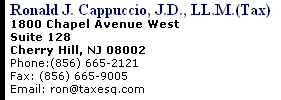|
New IRS
Regulations for the Manufacturing
Deduction for Business
lThe IRS has released much-anticipated final regulations on the
new, valuable "manufacturing deduction" for businesses. (NPRM
REG-111578-06) They follow up
proposed regulations issued ast year and contain some
"taxpayer friendly" provisions. But don’t count on simplicity: The
new regs are more than 300 pages long and retain some of the
complexities that have plagued taxpayers up until now.
Here are some of the key
points covered in the new regulations:
-
The deduction is
based on "domestic production gross receipts" (DPGR) from
qualifying activities, minus the cost of goods sold and other
allocable expenses. The result is your company's “qualified
production activities income” (QPAI).
-
A business can
deduct a percentage of its QPAI — three percent for 2005 to 2006,
six percent for 2007 to 2009 and nine percent after
2009.
- The proposed regulations treated sales and downloads of
software as a qualifying sale of a product, but the use of online
software as a nonqualifying service. The final regulations now
allow favorable treatment for online software.
- A taxpayer who wants to claim income from real property must
have constructed the property. The final regs make it clear that a
business may qualify if it performs management functions such as
oversight, inspection and approval. The taxpayer doesn’t have to
actually “hammer the nails in."
- The new regs liberalize the rules determining expenses
subtracted to arrive at QPAI. A simplified deduction method can
now be used by taxpayers with revenue of up to $100 million as
opposed to the previous limit of $25 million. This method allows
companies to allocate expenses based on qualifying and
nonqualifying receipts.
The proposed regs treated certain "embedded services" as gross
receipts, including warranties, delivery, operating manuals and
installation fees. A new exception is provided for embedded computer
software maintenance contracts. None of these services qualify if
they are separately stated or offered separately to customers.
Many Types of
Businesses Qualify
Obviously, the deduction is available to traditional
manufacturers of goods, food and clothing. However, the IRS has
extended this tax break to production activities in the following
areas:
- Music recordings and film
production,
- Electrical and natural
gas,
- Unbottled drinking water
production,
- Engineering and architecture
services, and
IRS guidance also provides several "safe harbor rules" to ease
administrative burdens for small businesses. For instance,
production activities in the U.S. must be "substantial" in order to
qualify for the deduction. (IRS Notice 2005-14) The IRS
says this test will be met by qualified small businesses if their
labor and overhead costs for the manufacture, production growth and
extraction of property equals at least 20 percent of the total cost
for the property.
The manufacturing deduction can be claimed by any type of
business entity, including C corporations, S corporations, limited
liability companies (LLCs), partnerships and sole proprietors.
Caveat: This is just a brief overview of the some
of the provisions in the regulations. To determine the full impact
for your business, call Ronald J. Cappuccio, J.D., LL.M.
(Tax) at (856) 665-2121.

| 













